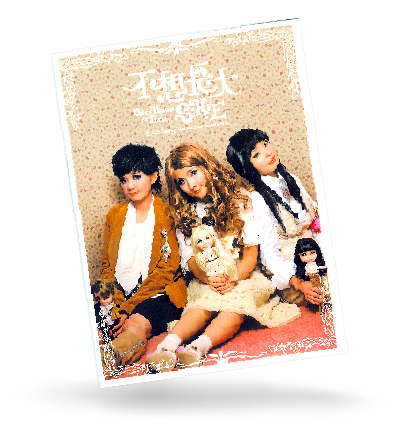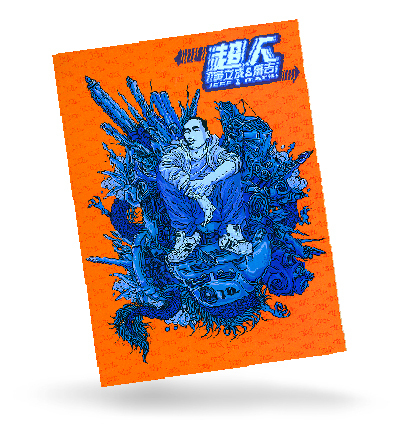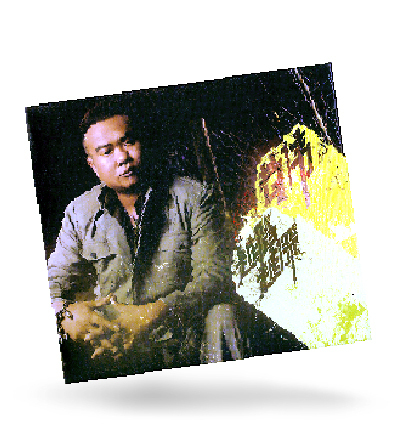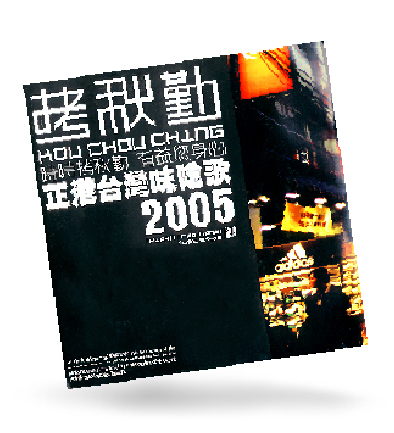S.H.E.
Once Upon a Time(不想長大)
HiM

Having spent the past several months making their acting debuts in the hugely popular ETTV (東森) drama series Reaching for the Stars (真命天女), one of Taiwan's most talked about all girl combos, S.H.E returned to record store shelves this week with a new album entitled Once Upon a Time (不想長大).
Since the trio made its musical debut in 2001 with Girl Friend, Girl Dormitory (
Much of the material is predictable and mundane and unless you happen to be a long time fan of S.H.E. then the album could make you uncomfortable. It should be pointed out, however, that unlike some other well known local female acts, S.H.E can hold a tune.

The highlight of the album is the tune Sharpshooter (神槍手). By mixing basic Mando-pop with traces of nakashi and throwing in an Ennio Morricone spaghetti western-like theme in for good measure, S.H.E has managed to come up with a genuinely unique sound that is comical and entertaining.
Jeff and Machi (黃立成 & 麻吉)
Superman (超人)

Warner
Ex-LA Boy Jeff Huang (
The group has become one of Taiwan's hottest hip-hop acts and its third album, Superman (

If you not a fan of hip-hop then this album is best avoided as, unlike previous releases, where the combo kept it fresh by mixing it up with differing styles, Superman is unadulterated, in-your-face hip-hop. It could be one of the best locally produced Mando-hip-hop albums of the year.
In addition to the Jeff and Machi material, local turntable guru DJ Tommy also gets in on the act with the brilliant Super Machi Remix, which sees the popular DJ getting creative with a whole bunch of Machi material.
With the exception of the DJ Tommy remix the album's other highlight comes when Jeff and Machi veer away from generic North American-like hip-hop and get creative with a more localized sound. While I Love Chou Hsing Hsing (我愛周星星) is certainly not the best "East meets West" musical coupling of all times it does have a catchy tune.
Gou Wei (茍偉)
The Further You Fall the Deeper You Get (越陷越深)
Univresal
OK, so Gou Wei (
The album kicks in with a funky piece of hip-hop that gradually morphs into Mando-pop and then transforms itself into a guitar driven piece of Mando-rock entitled My Style My Show (
Along with his solo material the album also sees the chubby un-pop star like Gou Wei teaming up with Taiwan's Power Station (
Without Turning a Hair (
Kou Chou-ching (拷秋勤)
Taiwan Traditional Music Style (復刻)
Design Fascination
If you're fed up with local acts that lamely attempt to sound like they come from a North American ghetto, then Kou Chou-ching's (
Aptly titled Taiwan Traditional Music Style (
If it sounds a bit odd then you'd be right as the material is so far removed from any and all other types of localized rap that it actually takes some getting used to. Listen to it once and you'll hate it, give it another listen after you've had time to digest what you heard the first time around, however, and you'll be pleasantly surprised.
Kou Chou-ching employs a host of earthy local musical styles, such as nakashi, classical opera and temple music, as well as recording several of the tracks in a gnarly KTV manner. Vocally the combo waxes lyrical, albeit it in a tongue-in-cheek manner, about everything from noodles to red envelopes Sure, not all the tunes are musically pleasing, especially when the group dabbles with instrumentation more commonly associated with funerals, but if your eardrums can withstand the nanguan and cringingly kitsch call-in KTV radio moments then it's well worth it.

April 14 to April 20 In March 1947, Sising Katadrepan urged the government to drop the “high mountain people” (高山族) designation for Indigenous Taiwanese and refer to them as “Taiwan people” (台灣族). He considered the term derogatory, arguing that it made them sound like animals. The Taiwan Provincial Government agreed to stop using the term, stating that Indigenous Taiwanese suffered all sorts of discrimination and oppression under the Japanese and were forced to live in the mountains as outsiders to society. Now, under the new regime, they would be seen as equals, thus they should be henceforth

Last week, the the National Immigration Agency (NIA) told the legislature that more than 10,000 naturalized Taiwanese citizens from the People’s Republic of China (PRC) risked having their citizenship revoked if they failed to provide proof that they had renounced their Chinese household registration within the next three months. Renunciation is required under the Act Governing Relations Between the People of the Taiwan Area and the Mainland Area (臺灣地區與大陸地區人民關係條例), as amended in 2004, though it was only a legal requirement after 2000. Prior to that, it had been only an administrative requirement since the Nationality Act (國籍法) was established in

With over 100 works on display, this is Louise Bourgeois’ first solo show in Taiwan. Visitors are invited to traverse her world of love and hate, vengeance and acceptance, trauma and reconciliation. Dominating the entrance, the nine-foot-tall Crouching Spider (2003) greets visitors. The creature looms behind the glass facade, symbolic protector and gatekeeper to the intimate journey ahead. Bourgeois, best known for her giant spider sculptures, is one of the most influential artist of the twentieth century. Blending vulnerability and defiance through themes of sexuality, trauma and identity, her work reshaped the landscape of contemporary art with fearless honesty. “People are influenced by

The remains of this Japanese-era trail designed to protect the camphor industry make for a scenic day-hike, a fascinating overnight hike or a challenging multi-day adventure Maolin District (茂林) in Kaohsiung is well known for beautiful roadside scenery, waterfalls, the annual butterfly migration and indigenous culture. A lesser known but worthwhile destination here lies along the very top of the valley: the Liugui Security Path (六龜警備道). This relic of the Japanese era once isolated the Maolin valley from the outside world but now serves to draw tourists in. The path originally ran for about 50km, but not all of this trail is still easily walkable. The nicest section for a simple day hike is the heavily trafficked southern section above Maolin and Wanshan (萬山) villages. Remains of